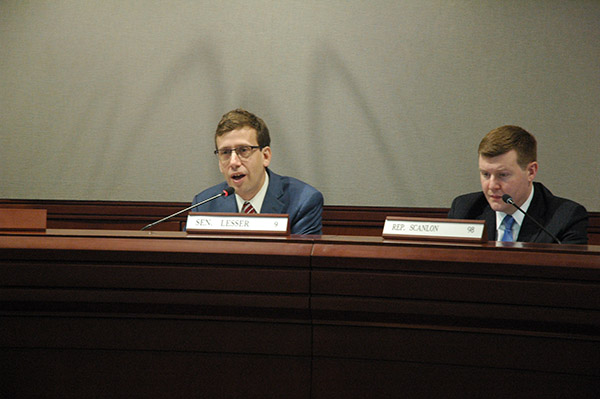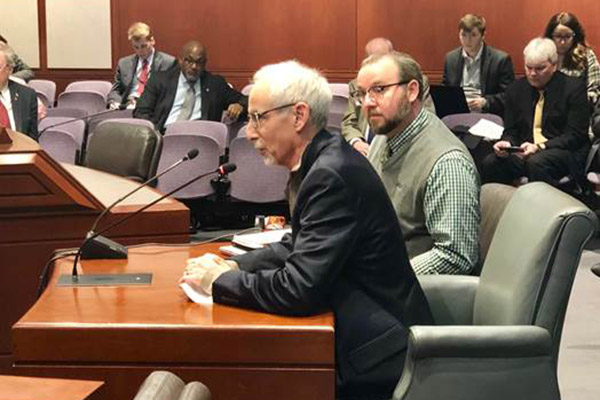Lesser Commends Advancement of Legislation to Get Control of High Deductible Health Plans

Insurance and Real Estate Committee co-chairs State Senator Matt Lesser (D-Middletown), left, and State Representative Sean Scanlon (D-Guilford), right, listened to public testimony on legislation to deal with the issues of high deductible health plans. (Thursday, February 28, 2019.)
HARTFORD, CT – Today, State Senator Matt Lesser (D-Middletown) heard public testimony on legislation which will tackle the issue of high deductible health plans. Sen. Lesser, who co-chairs the Insurance and Real Estate Committee with State Representative Sean Scanlon (D-Guilford), said the problem of high deductible health plans is one we need to solve now.
“I’m hearing from constituents who have high deductible plans – who are insured on paper, but have healthcare they cannot afford to access,” said Sen. Lesser. “We are committed to common sense reforms to ease the burdens and make sure everyone has access to healthcare.”
Rep. Scanlon said this is an issue plaguing his constituents as well. He said dealing with these high deductible plans is of the utmost importance to the committee.
“Increasingly high deductible health plans are becoming the most common form of health insurance my constituents have,” said Rep. Scanlon. “This bill is an attempt to make sure that people that have those high deductible plans are protected and they are not working towards a goal that automatically goes away. I want to credit my co-chair Sen. Matt Lesser for bringing this to our committee’s attention. I look forward to working with him and members of the committee to try to pass this legislation this year to give those folks with those plans the relief they deserve.”
If passed, Raised Senate Bill No. 902, “AN ACT CONCERNING HIGH DEDUCTIBLE HEALTH PLANS,” will require certain high deductible health plans to apply annual deductibles on a calendar-year basis, prorate yearly deductibles to reflect the portion of the year the coverage was effective, provide deductions for in-network as well as out-of-network covered benefits and not increase deductibles due to a plan providing family coverage or due to family size.
Healthcare Advocate Ted Doolittle provided public testimony in favor of this legislation. He did so wearing a pin which read HDHP, or High Deductible Health Plans, with a line through it. He said he is not anti-deductible, but said the state needs to take a look at how to alleviate the impact these exorbitant deductibles are having on Connecticut individuals and families.
“Right now we’re in a situation where high deductible health plans for families in 2020 could go as high as $14,000, that’s a lot like having no insurance,” said Doolittle. “That’s turning folks who have insurance into underinsured or effectively uninsured people.”
Doolittle said, similarly to Sen. Lesser, he has encountered many insured individuals who cannot afford access to their healthcare due to high deductibles. He said the proposed legislation is a practical approach to making health insurance affordable for Connecticut individuals and families.
“Deductibles have gotten so high and so bad that the plans have to recognize that something needs to give,” said Doolittle. “One of the things we should do is apply some rationality into the system by having plans where if you’re only in a plan for part of the year, you only have to pay for that part of the year. Another idea is if you find the drug cheaper out of network you should be able to count that against your deductible. It’s just unfair that if you’ve done the comparison that they’ve asked you to do, and you find that cheaper drug, that you do not get the credit.”
Raised Senate Bill No. 902 has formal language developed for it and if passed would go into effect on January 1, 2021.

